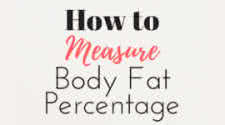Measuring Body Fat Percentage: Quick & Accurate Bodyfat Measurements

Bodybuilding & Science for the Ultimate Success Route
Here are a set of basic opinions on the various ways of testing bodyfat percentages. I have always been very unimpressed
with the bioelectrical-impedance method, That's the method where they put an electrode on your foot and another one on your
upper body, then see how fast electricity travels from one spot to the other. The time required for the electrical current
to go from one electrode to the other is supposed to give you a bodyfat percentage. This method can be accurate, but it is
very susceptible to wide variations depending on many factors such as time of day, elevation and water intake. It's my least
favorite way of testing bodyfat levels, and I have seen some truly crazy numbers from this method.
The infrared method is a little better for sure, but still not all that great in my opinion. This method sends an infrared
beam through a specific spot on the lower biceps and supposedly gives you back a bodyfat measurement. I have gotten accurate
measurements with this method, but the machine is expensive and the operator can get very de rent numbers by making tiny
mistakes in the placement of the infrared beam. Infrared machines are getting better all the time however.
The water-dunking method (underwater weighing) is considered the gold-standard way to check bodyfat. Of course, you have to
find a place that has a water tank for you to freeze your ass off in. You feel as if you are going to drown from staying
underwater so long. Accurate? Yes. Cost-effective and convenient? No.
Dual photon absorptiometry is a newer method that is considered very accurate (maybe the most accurate), but very few places
offer it. Besides, it's mostly for research at this time, so don't bother looking.
I am still partial to the good old fat calipers that pinch off some blubber and give you a bodyfat percentage based on a
formula - usually the Jackson Pollack protocol. I have had people get the underwater weighing method and the caliper method
done in the same place at the same time, and the results were almost identical. The caliper method has its own problems. For
one, it's very dependent on the person using the calipers and on the calipers themselves. Most of the research that demonstrated
the accuracy of this method was done with the Lange medical calipers made by Cambridge Scientific Industries. Using calipers
is not as easy as it looks, and you do need some training to get a truly accurate number from them. Usually an untrained gym
employee pulls out some cheap plastic calipers from his gym bag (after reading a booklet on how to use them) the best of
conditions - that is, the accurate Lange calipers being used by a qualified technician - there is a margin of error of 2
to 3 percent. God only knows what the margin of error is with cheap calipers and somebody who does not have a clue what he
is doing. You would not believe the number of people who have come up to me and said, "Joe from so-and-so gym took my bodyfat
and he told me I was 4 percent bodyfat," when I could easily see without even touching them that they were not a digit under 8
to 9 percent on a good day! Despite that warning the caliper method is quite accurate.
So is there a cheap and easy way to check your own bodyfat? Well, actually there is. When I was recently at a convention in
Las Vegas, someone asked me to try an inexpensive fat-measuring device called the Accu-Measure. In all truth I sort of rolled
my eyes and thought it was another el-cheapo plastic caliper that would give a bogus body- fat number when compared to the
Lange medical caliper I had my bodyfat tested by a friend at a local lab who is very experienced with the Lange calipers, and
then I tested myself with the Accu-Measure device exactly as the directions said to. I told my friend not to let me know what
he got for a reading using the Lange calipers so that his result would not influence me while I was using the Accu-Measure. We
both wrote down our reading on a piece of paper Well, guess what? The damn Accu-Measure's figure was almost identical to the
Lange's (No, lam not going to tell you what my bodyfat was!)
This is the first cheap (about $20) plastic caliper I have ever used that was so accurate I was able to test myself. The
measurement needed only to be taken from a single spot above the hip, and the device was very easy to use. For a cheap, simple,
do-it-yourself fat-measuring device, the Accu-measure is the way to go If I were you, I would use the device and skip the
little diet book Good luck.